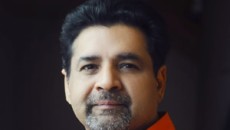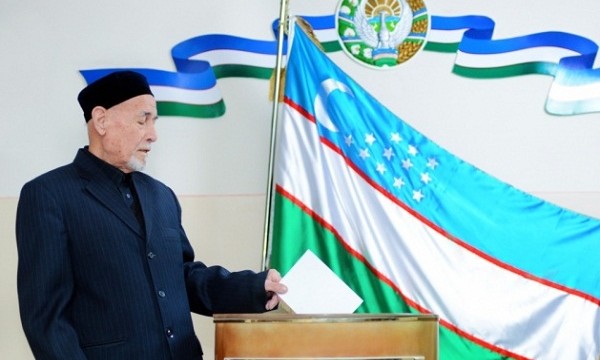Uzbekistan Presidential Election 2015 and western goggles—A review
By Agha Iqrar Haroon

Uzbekistan reelected President Islam Karimov as its next President for another next five year term. The success was of President Islam Karimov was expected because of constant upward economy, peace and security Uzbekistan enjoys under the rule of Karimov as the economy continues to grow reportedly expanding by 8.1% in 2014. The most important factor in constant success of Karimov in all elections since independence of this young Central Asian country is the factor of his being the “Father of the Nation and Founding President” of Uzbekistan.
The response of western media as well as western funded organizations over the results of election was also expected because western media as well as western human watch organizations and Organization for Security and Cooperation in Europe (OSCE) have always been critical and negative over young democracies of Central Asia since their independence.
Congratulatory messages coming from China and Russia again testifies that Central Asian republics are natural friends of these two neighboring countries sharing their historic and social backgrounds rather than western bloc despite neutral, balance and independent foreign policies these countries try to follow during the last two decades, particularly Karimov who has been very conscious to avoid any decision that can tag his country pro-Russia including refraining from Ukraine crises and leaving some initiatives like Russia-backed Custom Union. The response and conduct of western media and western-funded democracy and human rights watch organizations over March 29 elections is enough for Central Asian states to understand that they cannot win “friendship” of western bloc because western bloc has its own goggles to observe and it has different goggles to watch different regions. Its parameter to judge Gulf States is different than its parameters to judge Central Asia or South Asia regarding democratic norms.

The entire western media has never appreciated Central Asian democracies despite constant growth and peace some of Central Asian countries are providing to their people including Uzbekistan and Kazakhstan. Western media always forgets to mention and reports a pivotal factor for the successes of Karimov in all last presidential elections as western media never mentions that Karimov is respected as the “Father of the Nation” and “Founding President” of Uzbekistan instead merely a candidate. Karimov loves and respects Uzbekistan as his mother because Uzbekistan is everything for an orphan boy who was raised in an orphanage of Samarkand, growing up to study economics and engineering and reached to the level of the First Secretary (leader) of the Communist Party of the Soviet Union in 1989 and held the post of President of the Uzbek Soviet Socialist Republic (UzSSR) on March 24, 1990. He purged inter-ethnic clashes and instability in the Fergana Region in 90s and declared Uzbekistan an independent nation on August 31, 1991 and subsequently won Uzbekistan’s first presidential election on December 29, 1991, with 86% of the vote. He won March 29 elections by getting over 90% of the votes out of 17.2 million polled votes.
Western media claims that Karimov ran against three “little-known” candidates forgetting the fact that all candidates were give equal time to run their campaigns and equal opportunities were granted on national media including television and newspapers to share manifestos and political visions.
The Organization for Security and Cooperation in Europe (OSCE) claimed that the Uzbek poll lacked “genuine opposition” without explaining what parameters are of OSCE for a “genuine opposition”?
The OSCE released preliminary assessment claiming that national media of Uzbekistan “rigidly restrained media coverage gave the incumbent (Karimov) a clear advantage” although OSCE itself accepted in its statement that all candidates were granted equal access to the media and this observation of OSCE is difficult to understand because it is self contradictory and full of ambiguity. It may be mentioned that western organizations such as the OSCE and its component ODIHR have never judged any of Uzbekistan’s previous parliamentary or presidential elections to have been free and fair but never provided any legal and constitutional facts, data and proofs that could support its criticism and claims in tangible form.
Other concerns raised by ODIHR included hurdles preventing anyone from standing as an independent candidate. This observation is also interesting because Uzbek Constitution does not allow independent candidates to contest elections and only political parties nominate their Presidential candidates. Therefore, ODIHR actually criticized the Constitution of Uzbekistan that does not fall under the parameter of any organization to criticize constitution of any independent state while observing elections.
The ODIHR also said that “voter lists were compiled in a variety of ways throughout the country, and inconsistency in the method of compilation put the accuracy of voter lists in doubt.”
This allegation is also fascinating because all candidates were allowed to procured voting lists because these lists were released months before election in accordance with Election commission rules. According to rules, voting lists were provided to all candidates who had been reviewing lists in regular meetings held with Election Commission.
If we review this election without western goggles, than we see that observers from other missions including Commonwealth of Independent States (CIS) and Shanghai Cooperation Organization (SCO) found election as transparent, legitimate and according to rules.
CIS observers gave positive assessment of the election and independent development observers observed hording of candidates all over the country, equal spaces given in official newspapers, advertisements in private as well as public newspapers and televisions and campaigning of all candidates since February 17—the official day of starting public campaigning for March 29, 2015 elections. The head of the CIS election observation mission, Sergei Lebedev observed that election was “transparent, free, and democratic.”
Lebedev also said the CIS monitors “have the unanimous opinion that the election was well governed and effective.”
The Shanghai Cooperation Organization (SCO) also sent monitors. Uzbekistan is an SCO member along with Russia, China, Kazakhstan, Kyrgyzstan, and Tajikistan. SCO observer mission chief Dmitry Mezentsev, was of the view that election campaign event was open and transparent and strictly complied with Uzbek legislation.
It is worth to mention that CIS and SCO started sending monitors to elections about a decade ago after polls in the region were repeatedly judged by Western organizations to have fallen short of being free and fair.
It may be mentioned that Central Election Commission of Uzbekistan accredited more than 300 international observers, while political parties deployed more than 35,000 representatives on Election Day.
March 29 Presidential election again confirms that election observers of western bloc despite having huge resources on their disposals are still shy to observe democratic processes in Central Asia at ground level and still depends upon media reports of western media and observation reports are usually pre-fixed and serotype.
Next Presidential election in Central Asia is going to be held in Kazakhstan on April 26 and there is strong possibility that we will read similar observations giving by western bloc about Kazakhstan without understanding with local politics, consituttions and election processes.
